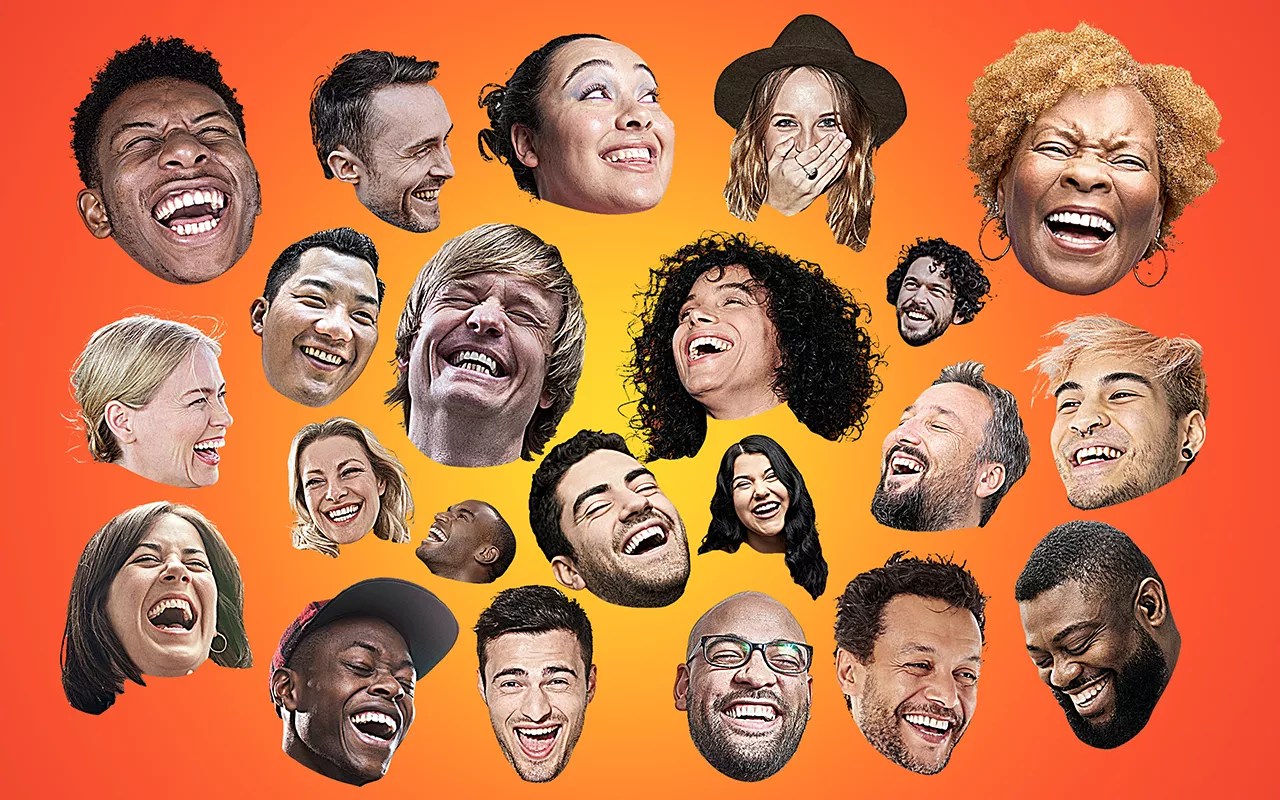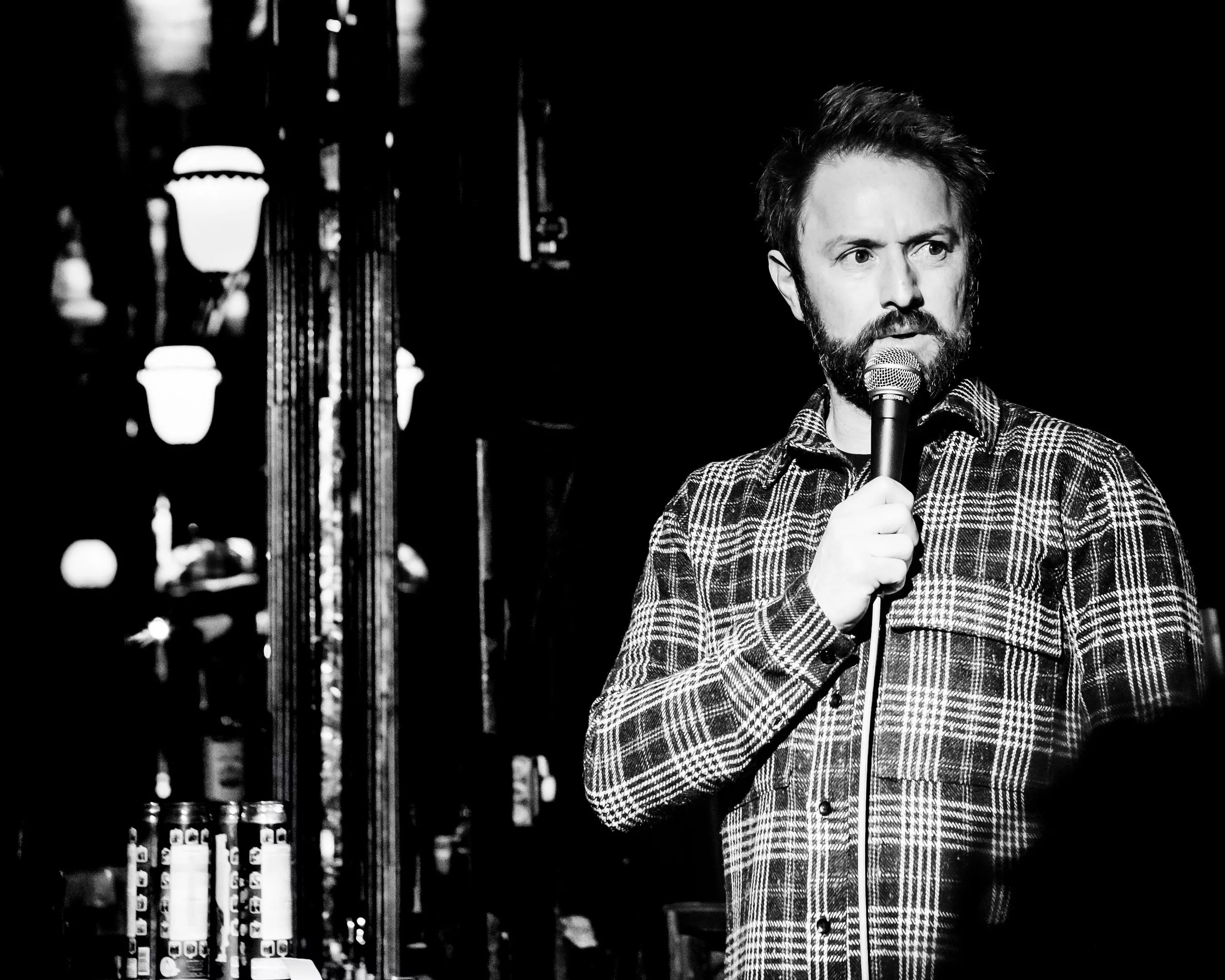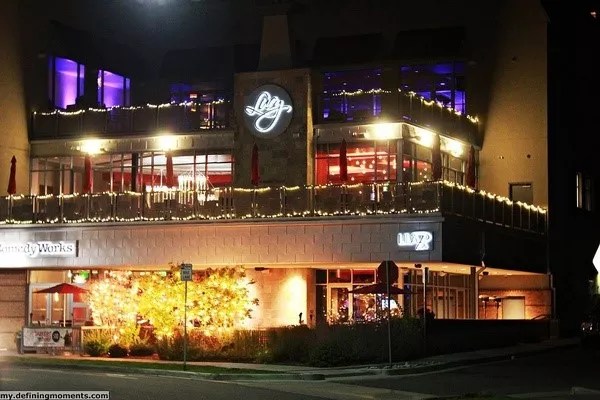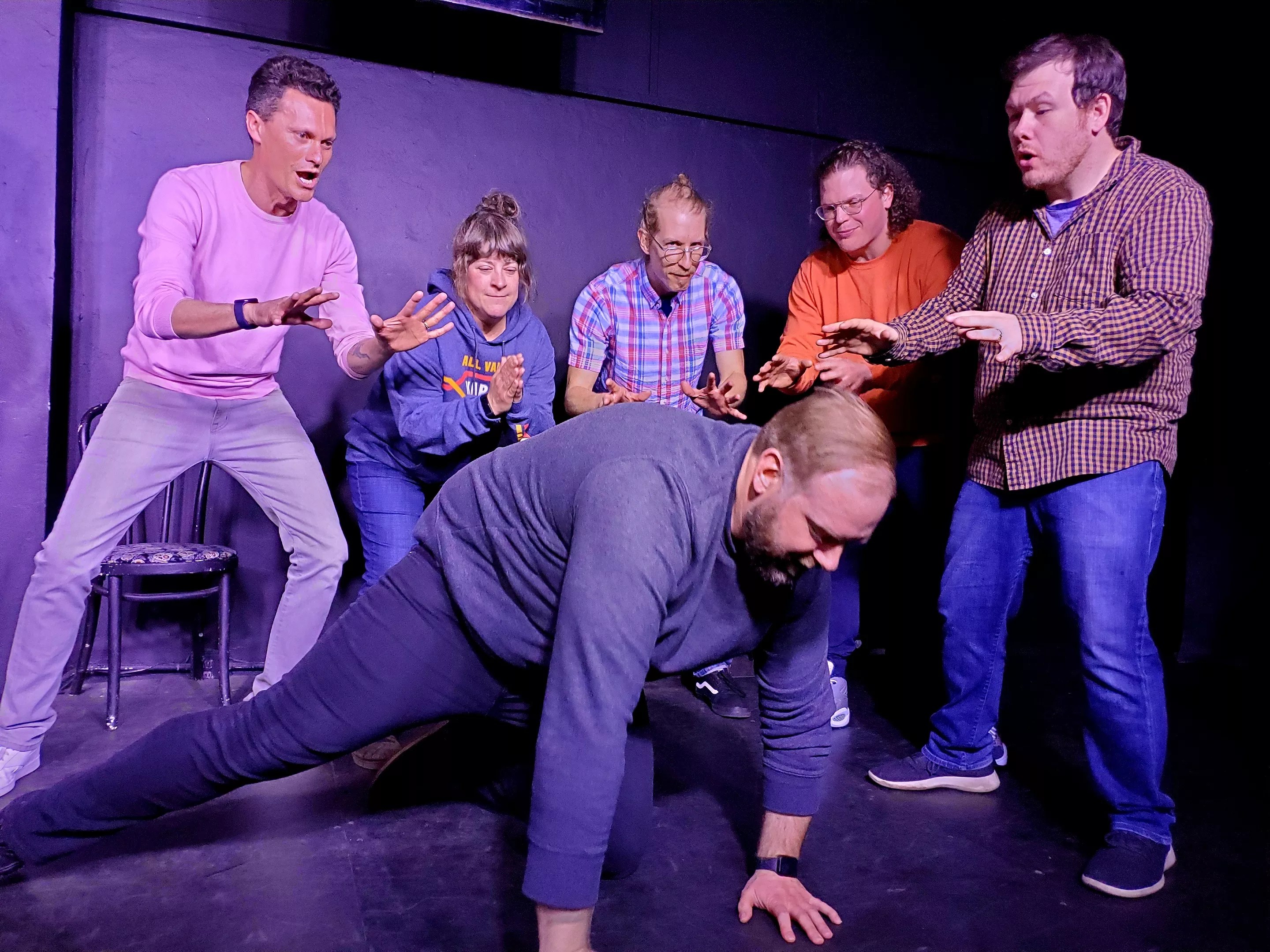
Getty Images/Westword Photo Illustration

Audio By Carbonatix
On the last day of January, the Denver Improv transformed into a coliseum of comedy for the Roast Battle World Championship, bringing some of the funniest comics from around the globe to trade barbs and jests in their quest to be crowned world champion roaster.
The lineup included Ryan Nesen from Los Angeles, John Ajodah from New York City, Shalaka Kurup from London and Ryan Cullen from Scotland, all chosen to represent their respective areas. Denver was selected to serve as the battleground because the city is a “neutral location” with an audience that appreciates comedy, according to organizers. While Nesen became the first-ever Roast Battle World Champion, Denver won points as a comedy powerhouse.
“I think it’s incredible exposure for this market,” says Chris Gottlieb, general manager of the Improv. “When you look at the major markets in the United States, you see New York, Los Angeles and Chicago; they’re massive, but Denver is not far behind. … Out of this whole experience with Roast Battle, I hope the rest of these markets see that Denver is a major player in this industry.”
While the Mile High City may be famous for its breathtaking mountain views and craft beer scene, it’s also become a hub for laughter. Comedy’s A-listers perform before sold-out crowds at the Oriental, Paramount and Bellco theaters, Ball Arena and even the legendary Red Rocks Amphitheatre, but the intimate, local side of Denver’s comedy scene is also winning fans.

Adam Cayton-Holland has achieved national notoriety while staying in Denver; catch him at Chaos Bloom on March 14.
Sarah Elizabeth Larson
“I think Denver has always been great for comedy because it’s a smart city but it’s not an industry town,” says comedian Adam Cayton-Holland, a Denver native and former Westword staffer known for his work with the comedy trio the Grawlix and its web TV series, Those Who Can’t, as well as for his solo efforts and founding the High Plains Comedy Festival. “So no one is at shows because they might see a famous person, or some huge drop-in from a massive comic, or the next person to make SNL; they’re just there to see funny comedy. So they’re an incredibly honest barometer of whether a joke works or not. Denver crowds are some of the best in the country, because they’re ready to laugh, but they’re discerning. I think that’s why Denver churns out so many good comics and punches above its weight.”
From its modest beginnings, when local talents cut their teeth in small bars and on makeshift stages, to the bustling ecosystem it is today, Denver’s comedy scene has displayed resilience, creativity and community.
“The comedy scene has evolved a ton since I started in 2004,” Cayton-Holland says. “Honestly, Comedy Works Downtown was the only show in town. There were a handful of mics and weird showcases at shitty suburban sports bars, but the scene was tiny, and not a lot was going on outside of Comedy Works. A handful of open mics a week, but slim pickings.”

Exterior of Comedy Works Landmark.
Courtesy of Comedy Works
The iconic Comedy Works, established in 1981, laid the groundwork for what would become a thriving comedy culture. With its downtown and Greenwood Village locations, which opened in 2008, Comedy Works became a beacon for both emerging and established comedians, earning a reputation as one of the nation’s top comedy clubs.
“There wasn’t a lot of comedy back then. There was Comedy Works, and another club in Aurora, George McKelvey’s comedy club, but when I started in 1986, that was the end of a comedy era,” recalls Comedy Works owner and booker Wende Curtis, who started out waiting tables at a now-defunct Fort Collins Comedy Works location. “It wasn’t as big of an industry back then. There have been lots of different phases in Denver’s comedy scene, and this phase is a boom. There’s been a massive explosion, and it has certainly been coming for a while with all these big touring acts, but it’s really taken off post-COVID. There are so many different acts at clubs across the city now.”
During the pandemic, she notes, social media was a driving force in connecting great comics with larger audiences.
“Comedy lovers during COVID got to know more about it because they had time, and people certainly needed to laugh,” Curtis says. “I think podcasts kept things going because they couldn’t do live shows, and everyone hated all the weird stuff that we all tried to do on Zoom. Again, the explosion was already happening, but in terms of our business, the pandemic really helped. … We’re selling more tickets than ever before: 2019 was a banner year, and we had almost a whole quarter of 2020 that looked super fat and healthy. Since COVID, it’s better; we just keep selling more and more tickets.”
Parallel to the growth of Comedy Works and the Denver Improv is the rise of alternative comedy nights, local festivals and open mics. This grassroots movement paved the way for a new generation of comedians to redefine the boundaries of humor. Venues like the Lion’s Lair, Bug Theatre, RISE Comedy and Wide Right have played pivotal roles in this expansion, offering stages for comedians to experiment, refine their craft and build their following. And this surge in open-mic opportunities has not gone unnoticed by the industry’s bigger players.

Wende Curtis went from cocktail waitress to owner of Comedy Works.
Comedy Works
“My philosophy is very different than most clubs and club owners in the country: We do comedy, so we need to be spending energy on developing comics,” Curtis says. “I have always put energy and money into paying professional comics to help run New Talent Night. We lost Deacon Gray after twenty years to cancer, who ran our new talent night, and we’ve had a couple of different people running that since then, but you have to put some energy into it; you can’t just take the trees from the rainforest – you’ve got to put more back in.
“Many years ago, Adam Cayton-Holland approached me and asked, ‘How would you feel if I did a show at [another venue]?’ It was going to be a regular gig, and I said go ahead,” she continues. “My team, as well as others across the country, were asking, ‘What are you doing? It’s taking away from your open-mic night!’ But I thought it was the right thing to do, and that was the start of an explosion. What a genius I am! Because of how successful it was, all of these other open mics started popping up, and slowly, every Tom, Dick and Nobody that we don’t even know has an open mic that they run. This is fantastic for them, because it gives them all this stage time, which helps them improve faster. People don’t do it by standing at their bathroom mirror; they do it by stage time. Denver is pretty supportive of one another. Comedians have moved here, like Georgia Comstock, because of this scene. She had gone as far as she could in her hometown, so she moved, and someday we’ll probably lose her to New York.”
Cayton-Holland is proud of the indie comedy scene that he and his friends, including Ben Roy and Andrew Orvedahl, kicked off in Denver. Because they had yet to earn regular stage time at Comedy Works, the ambitious group started doing its own shows.
“Alt-comedy in the 2000s is a well-documented phenomenon, and I was cognizant of it and wanted to emulate things I had seen or heard about in NYC – Luna Lounge [and] Invite Them Up are two shows that come to mind – so we started doing a show called Los Comicos Super Hilariosos at the Old Curtis Street Bar (now Wide Right) and quickly moved on from there to an art gallery/warehouse space called Orange Cat Studios, which is now the bar Matchbox,” Cayton-Holland recalls. “That’s when things really started to pop. We had an insanely sold-out monthly show, national headliners would pop in – it became a sort of hub for indie, intelligent, outside-of-the-mainstream comedy in Denver.
“It wasn’t just standup, though that was the crux of it, but we would do sketches as well, live and video. We would do a news segment, we would have bands and musicians on the show – lots of left-of-center stuff,” he continues. “That led to the Grawlix, which led to our TV show, Those Who Can’t. … I helped kick-start an alternative comedy scene in Denver, outside of the clubs – while always playing the clubs, as well. Of that, I’m quite proud. Denver now has one of the more robust indie comedy scenes in the country, with showcase shows all over the city every night of the week, as well as many other alternative comedy clubs, in addition to Comedy Works. Comedy Works paved the way for everything by making Denver this comedy-savvy city and being one of the best comedy clubs in the country, so the appetite for comedy was there.”
Rather than directly compete with the plethora of alternative performances and open mics across the city, the Denver Improv’s Roast Battles provide an outlet for local talents to try their hand on its stage.
“There are three to five open mics and local shows that happen every night throughout Denver,” Gottlieb notes. “It’s an incredibly enriched community, and I don’t see a need to cannibalize that business essentially by outright competing. I very much believe that, coming out of the pandemic, competition in business and in general has changed. I don’t think it’s all about snuffing out your competition; I would rather collaborate. All these open mics are happening, and they’re all different quality levels. They’re not all fantastic, but by and large, these guys are doing a great job, so I don’t feel the need to push them out. I’d rather help cultivate that.”
Cayton-Holland’s High Plains Comedy Festival mirrors Denver’s evolution into a comedy hub. Inspired by Portland’s Bridgetown Comedy Festival, Cayton-Holland sought to showcase Denver’s comedic talent on a national stage. Over the past ten years, the festival has grown from a local gathering to a national destination for agents and managers seeking a spot for their clients, emphasizing Denver’s significance in the comedy world.

Chaos Bloom Theater tries out some improv.
Courtesy of Chaos Bloom Theater
Adding to Denver’s comedy mosaic is the Flea Market, a testament to the scene’s diversity and innovation. Hosted since 2021 by Rach Angard and Jared McBain, the monthly variety show blends standup, theater and performance art, challenging traditional comedy boundaries and reflecting the city’s eclectic spirit. That spirit is inclusive, as demonstrated by Vatos Locos, the city’s first bilingual comedy festival, which Ricky Ramos organized last September to celebrate Mexican-American culture and heritage.
Denver’s unique position in the comedy landscape has attracted a constellation of comedy stars, too, making the city a regular stop on national tours and a favored location for recording specials.
In the last year, comic Jim Gaffigan had a sold-out six-night run at the Paramount and will be back for more in Colorado in September; Chelsea Handler was at Red Rocks; Lewis Black spent three days in Colorado as part of his final tour; Jerry Seinfeld played the Bellco Theatre; Taylor Tomlinson, the new late-night host of After Midnight, performed here; Michelle Wolf stopped by Comedy Works; Denver native Troy Walker, who now writes for Jimmy Kimmel Live!, swung by Comedy Works South; Nikki Glaser, who attended the University of Colorado Boulder for a year and recorded her 2022 special at the Paramount Theatre, returned for a series of New Year’s Eve shows; rising star Hannah Berner sold out her first appearance at the Paramount; Denver native Tim Allen returned to the Bellco; veteran performer Paul Reiser taped his show at the Newman Center; and Iliza Shlesinger, who recorded her 2015 Netflix special at the Gothic Theatre, was the first woman comedian to headline Ball Arena.
“Denver is one of those cities where I always had great experiences,” Shlesinger says. “I started at Comedy Works and kept coming back to do multiple sold-out shows. I did the Bellco Theatre, and now we’re playing the Ball Arena. I have a longstanding comedic history with Denver, just from their audiences treating me like a local and always showing up. I chose the area to film Freezing Hot because, at the time, it was one of the cities that I felt most comfortable in, and I still do, because the crowds there are just smart, excited and love to party. Usually, loving to party and being smart don’t go hand in hand, but in Denver’s case, they do.”
Known for their enthusiasm, Denver crowds encompass a wide range of tastes and are willing to experiment with the city’s array of open mics as well as new venues, such as Chaos Bloom Theater. And rather than passive consumers of comedy, audience members are active participants, creating an energetic atmosphere that fuels performers.
“Denver is the perfect comedy city,” says Pat Barker, a comedian who serves as commissioner of the Roast Battle League. “I’ve had the pleasure of performing out there a few times, and it has sort of that Middle American blue-collar sensibility that I love, but it’s an intellectual city on top of that. Nobody’s too sensitive about anything, but they’re smart enough to get all the jokes; it’s the perfect middle ground for a Venn diagram of America.”
“I feel like they’ve gotten smarter and smarter,” Curtis agrees. “We’ve always had great, smart audiences, but I feel like they’ve continued to get more comedy-savvy. Denver is a very hot market. The number of people in this state, and specifically in this metropolitan area, that go out to live events is higher than a lot of the averages across the entire country. That, combined with what we’ve done in comedy, makes Denver’s entertainment industry very lucrative. It’s probably one of the hottest markets in the country. L.A. and New York will always be what they are, and then there’s Chicago, Houston, Atlanta and Boston, but they don’t have the same club presence that Denver does. … Denver is in a comedy boom, and we’re not slowing down anytime soon.”